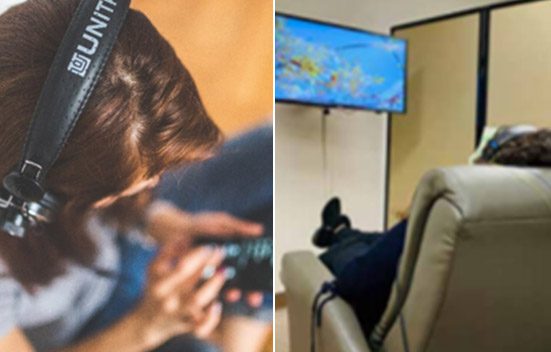Neurofeedback Podcast
Ever feel like your mind is, you know, stuck on a hamster wheel of worry? I think we’ve all been there.
Totally.
Just that constant search for a little bit of calm in all the chaos.
And that actually is the perfect jumping off point for today’s deep dive. We’re talking about neurofeedback, a potential game changer for managing, well, anxiety.
It’s exciting stuff.
Yeah. And it’s not just another meditation app. No. This is about retraining your brainwaves.
So to help us unpack all of this, we have our expert.
Maybe we could start with just, like, what is neurofeedback?
Yeah. For sure. For sure. So one of the things that we read, I think, kinda helps to think about it is almost like a video game, like, for your brain Oh. Which I know maybe sounds kinda out there.
But No.
That’s cool. It’s a good visual.
Yeah. It’s about conscious control. So imagine instead of your fingers on a joystick, you’re changing what happens on the screen by using just your brainwaves.
Woah. Okay. So before we go full sci fi here, let’s break down what’s actually happening. Like, what are brainwaves? What am I dealing with here?
Yeah. At the heart of all of this is something called an EEG.
An EEG.
Yeah. Or an electroencephalogram.
Basically, think of it like a microphone for your brain.
It picks up on these tiny electrical signals that our brain cells use, like, to communicate with each other.
Okay. So it’s not like reading my thoughts or anything?
No. No. Not at all. It’s just these electrical impulses.
Okay. Just checking. So, like, what do these impulses how do those even connect to my mental state?
Well, that’s the really interesting part. So different patterns of brainwaves, like different rhythms or frequencies, are actually associated with different mental states.
Really?
Yeah. So, like, let’s say you’re really alert and focused. Mhmm. Your brain might be humming along with those, like, really fast paced beta waves. But when you’re relaxed, you know, maybe you’re daydreaming or about to drift off to sleep, you’ve got those slower, more rhythmic alpha waves that kinda takes center stage.
So it’s almost like your brain has different soundtracks for different moods.
That’s a great way to put it.
Like that.
Yeah. And with neurofeedback, we’re basically trying to give you more control over the DJ booth in your mind.
I am so into this music metaphor right now. So how do we how do we queue up more of those relaxing alpha waves, let’s say? Like, how does that Yeah. Work?
Okay. So imagine this. You’re sitting there. You’re comfortable. You’re hooked up to the EEG. You might be watching something on the screen or listening to music.
And as your brainwaves shift into those calmer alpha frequencies, you’re gonna get some positive feedback. So maybe the screen brightens or the music gets a little richer. And so it’s almost like your brain is getting a little reward for, you know, heading in the right direction.
Okay. So it’s almost like, I don’t know, like, we train a dog with treats. Like, your brain is learning this new skill.
Yeah. That’s actually a really good analogy. Over time, your brain starts to recognize, hey. When I create these brainwave patterns, good things happen. And just like any skill, the more you practice, the better you’re gonna get at it. Right.
Okay. So it’s not just as simple as me just, like, you know, closing my eyes and thinking calm thoughts. There’s more to it.
Exactly. Neurofeedback is really about helping you become aware of those subtle shifts in your mental state. You know, the ones that you might not even consciously notice otherwise.
Right. Right. Okay.
So it’s like having a personal trainer for your brain. You know? Okay. They’re giving you that real time feedback and guidance.
So, like, that mind body connection, but on this, like, whole other brainwave level?
Yes. Exactly.
This is cool. Okay. So for our listeners out there who are maybe thinking, okay. How does this compare to, you know, medication or therapy, more traditional approaches to dealing with anxiety? How does neurofeedback fit in there?
That’s a really good question because it’s not about replacing those tools, but more about, like, adding another really powerful option to your toolkit.
Oh, okay. Okay.
So So one of the biggest advantages of neurofeedback is that it’s really working directly with your brain’s natural processes.
Mhmm. There aren’t any medications involved, so you don’t have to worry about any side effects.
That’s huge, especially for people who are maybe sensitive to medications or just prefer a more, you know, natural approach.
Yeah. What about therapy? Like, how does that work with neurofeedback?
They actually can work really well together. Think of therapy as helping you to understand kind of the why behind your anxiety. Mhmm.
You know, Like, identifying maybe what your triggers are or those unhealthy thought patterns that you might have.
Neurofeedback, on the other hand, that’s more about training your brain’s response to those triggers. Yeah. So you’re really addressing the anxiety at multiple levels. Okay.
So they’re kind of on the same team working towards the same goal, just from different angles.
Exactly.
I like that. So what else what else makes neurofeedback really unique?
Well, one of the things that I think is really interesting is well, one of the things that I think is really interesting is that it’s very personalized.
Yeah. This is actually what I was gonna say.
Oh, really?
Yeah. I was reading about that. It’s not like a one size fits all approach, which again, like, makes sense given how unique our brainwave patterns are, like we were just talking about.
Yeah. Totally. It’s like a fingerprint, you know.
Oh, okay.
Everyone’s got their own unique brainwave signature. So in a neurofeedback session, the system, it isn’t looking for some, like, generic calm state.
Right.
It’s tailored to you.
Oh, that makes sense.
Yeah. To your baseline, your goals, and even, like, how your brain responds throughout the section.
Okay. Okay. So this all sounds amazing, but I have to ask. For the listeners out there who are thinking, is this too good to be true?
Right.
What does the science actually say? Like, does this really work for anxiety?
Yeah. And that is, I mean, that is the million dollar question. And it’s something that researchers have been looking at and, you know, really rigorously exploring. And there is actually a growing body of evidence that suggests that neurofeedback can be really valuable tool for managing anxiety.
Like, are there any, I don’t know, specific examples of studies or anything that, you know Yeah.
For sure. So there was one study that was published in the journal neuroregulation, and they found that people with generalized anxiety disorder, GAD Okay. Who did neurofeedback training, they experienced, like, on average, a thirty percent reduction in their anxiety symptoms.
Thirty percent? That’s that’s huge.
Yeah. Especially for something like GED. Right. Which, you know, can be so disruptive to just life in general. Absolutely. And and what’s even, you know, maybe even more exciting is those results were seen after just ten sessions of training.
Oh, wow. Okay. So not, like, years of trying to figure this out. That’s pretty fast.
Yeah. I mean, a lot of people, they struggle for years to find relief from anxiety.
For sure.
And so this is showing that, you know, there’s a lot of promise here.
Yeah.
And while most of the research so far has focused on anxiety, there’s also some really promising evidence that’s coming out for things like PTSD Oh, wow.
ADHD Right. Even chronic pain.
So neurofeedback can be used for a lot of different things.
Yeah. Exactly.
It’s really about, like, tapping into the brain’s ability to kind of Adapt. Yeah. Adapt and learn.
Learn. Exactly. And I think as, you know, technology advances, our understanding of the brain deepens. I think we’re gonna we’re gonna continue to unlock even more, you know, possibilities with this.
That is super exciting to think about. Okay. So let’s say, you know, someone’s listening to this and they’re like, alright. I’m intrigued. Yeah. What do I do? Like, what does a session actually look like?
Yeah. Totally. Let’s let’s demystify it a little bit. So you’d start with a consultation. And this is really just about getting to know you, like your history with anxiety, and you know what you’re hoping to kind of achieve with neurofeedback.
So personalized from the get go.
Exactly. So during the actual session, you’ll be, you know, you’ll be comfortable. You’ll be seated, you know, kinda like you’re settling in to watch a movie or listen to music. Yeah.
The clinician will put some sensors on your scalp, but don’t worry. It’s totally painless.
And can I ask about that? Is it, like, needles?
No. Nothing invasive at all.
Okay. Good to know.
Yeah. They’re just picking up on those brainwave signals. Mhmm. And you might see a screen with, like, visuals or listen to audio feedback that’ll change based on your brainwave activity.
So it really is like a video game in a way where I’m, like, using my brain to kinda make things happen on the screen.
Yeah. That’s a great way to kinda visualize it.
Okay.
And so as you practice, you’re basically training your brain to recognize and reinforce those desired brainwave patterns Mhmm.
That are associated with, you know, that calmer, more focused state that we want.
So it’s not me, like, actively trying to force myself to think calm thoughts. It’s more about, like, letting the feedback guide me there.
Yeah. You got it. It’s about building that awareness, giving your brain the tools to, like, self regulate.
I like that. And, like, how long does a session usually last?
So, typically, you’re looking at somewhere between thirty to sixty minutes Okay.
Depending on the person and, you know, the treatment plan.
And how many of these sessions would someone need to do before they start to feel a difference? Like, is this a quick fix, or is this more of a long term thing?
That’s a really good question. And, you know, like any form of training, like, consistency is key with neurofeedback. It’s not a quick fix. It’s more about, like, gradually retraining your brain patterns over time.
Okay. So more like building a muscle than taking a magic pill.
Exactly. Exactly. So, you know, most practitioners, they recommend a course of maybe twenty to forty sessions, you know, spread out over a few weeks or months to really see those, like, lasting results.
Okay. Yeah. That might sound like a lot. But, I mean, when you think about, like, potential long term benefits, I mean, who wouldn’t wanna retrain their brain for more calm? You know? Right. It seems like a worthy investment.
Yeah. I think so too. And what’s interesting is a lot of times, you know, those skills that you learn, they kind of they extend beyond just those sessions.
Right.
So it’s almost like you’re developing, like, this heightened awareness of your mental state, and you’re giving yourself the ability to, like, self regulate when you start to feel that anxiety kinda creeping in.
Yeah. That’s actually what I was wondering. So, like, is this something that, you know, once you’ve done neurofeedback, are you good, or is it something that you kinda have to keep practicing and maintaining long term, like meditation or something like that?
Yeah. It could be a little bit of both, honestly. It really just depends on the individual and, you know, what their goals are. Some people might find that after they do a course of sessions, they feel like, okay.
I’ve got the tools. You know? Yeah. I’ve got the self awareness to kind of manage this on my own.
Okay. And then other people might choose to, you know, continue with some occasional, like, booster sessions or maybe they incorporate it into kind of their overall wellness routine.
So it’s about finding what works for you.
Again, not a one size fits all Exactly.
Which I like. Okay. So for our listeners here, like, okay. This sounds great, but is it right for me? Like, what are some signs that maybe someone would, you know, benefit from checking this out?
Yeah.
I mean, if you’re someone who’s been struggling with, like, chronic anxiety, maybe you’ve tried, you know, other approaches Yeah.
And you haven’t really found something that sticks, or maybe you’re just looking for, like, a non medication option.
Mhmm.
You know? Something like that. Neurofeedback could be, like, a really valuable tool to look into.
What about for those who are, like, already in therapy or, you know, on medication? Can neurofeedback still be helpful?
Oh, absolutely. Yeah. I mean, like we were talking about earlier, you know, it can be a really great complement to therapy. Right? Right. Working on those brain level responses to kind of the emotional work that you’re doing in therapy. And then, you know, for folks on medication, again, always, always, always talk to your doctor.
Of course.
Yeah. But, you know, sometimes neurofeedback can be a pathway to, like, maybe reducing that medication dependence down the line.
Right. It’s all about finding the right combination, you know, for you.
Exactly.
This has been fascinating. I feel like my brain has, like, expanded.
I love it.
And hopefully calm down a little bit too. So as we wrap up here, is there any, I don’t know, final thought or question you would leave with our listeners as they kind of continue to explore this topic?
Yeah.
I mean, I I think what’s so cool and, like, honestly exciting about neurofeedback is Right.
It really just points to this incredible potential we have to, you know, change our brains. Yeah. And, you know, in turn, change our lives. Kinda challenges this old way of thinking, you know, that our brains are just, like, fixed.
That we’re stuck with whatever patterns we’ve developed, you know? And I don’t think that’s true at all. So I guess my question for your listeners would be, if we can learn to, like, consciously influence our brainwaves Mhmm. What else?
You know? What other, like, seemingly impossible things might we actually be capable of achieving?
That is a powerful question to end on.
Right.
Love it. It’s a good reminder that, you know, we are constantly evolving. Our brains are capable of really incredible things.
Well, thank you so much for, taking us on this deep dive. It was great. My pleasure as always.
And to our listeners, if you are feeling inspired to learn more, we’ll have some additional resources linked in the show notes.
Until next time, keep those minds curious and those brains buzzing, but, like, in a calm alpha wave kind of way.




